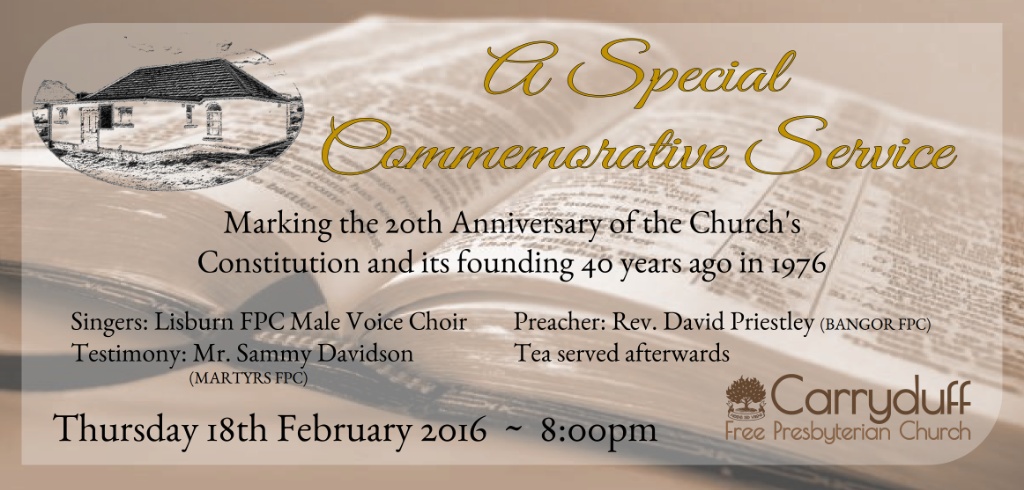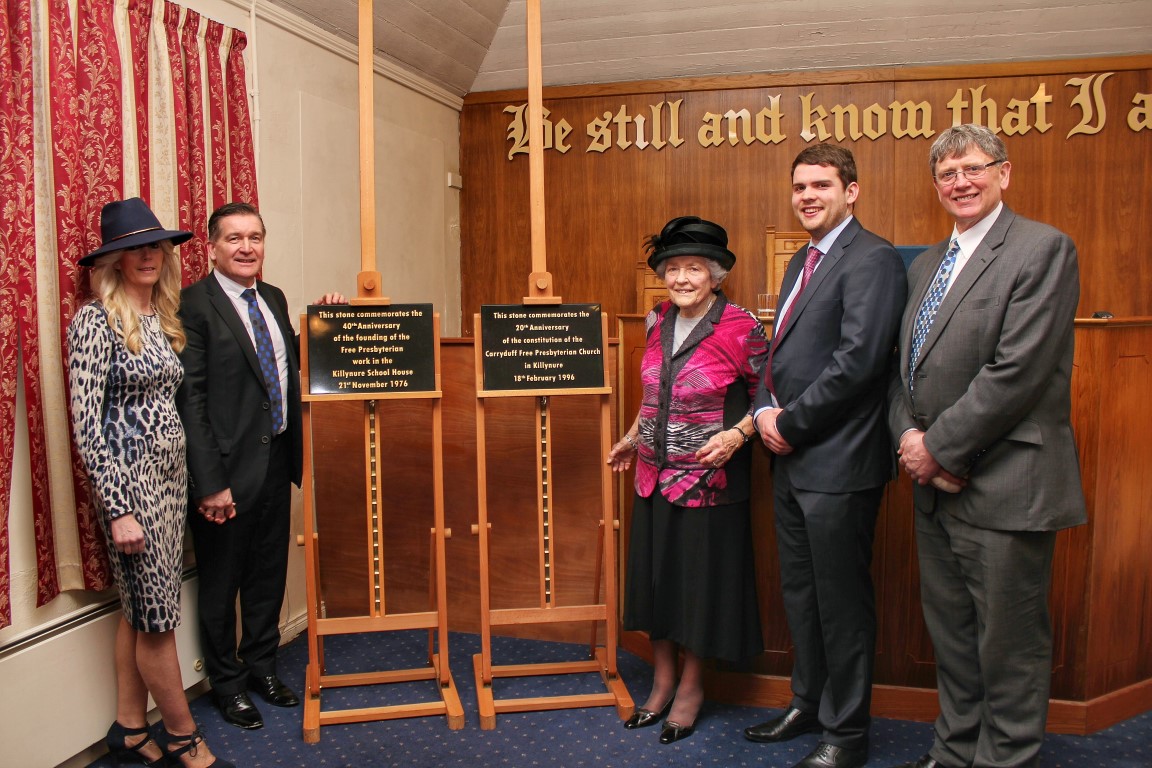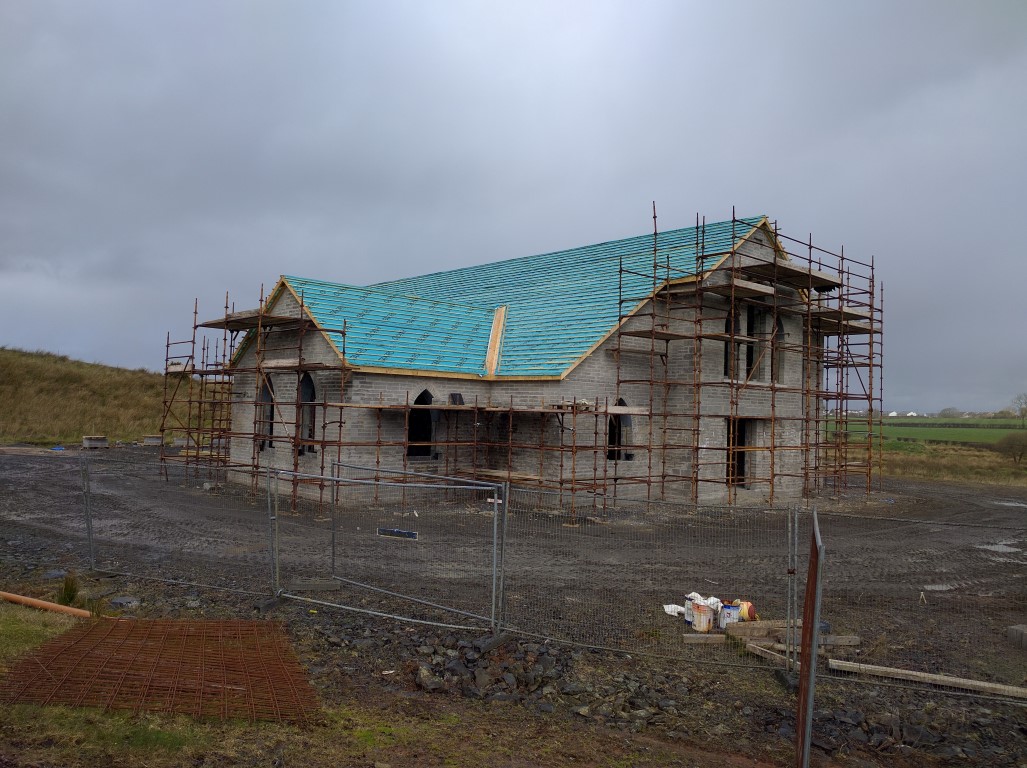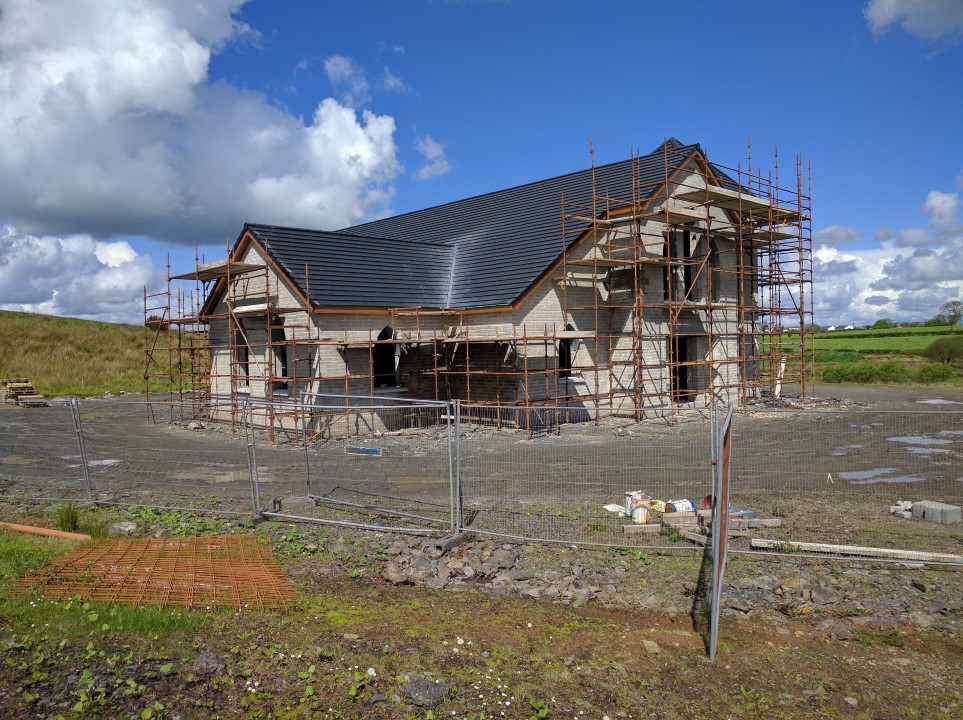Table of Contents
Special Commemorative Service, Thursday 18th February 2016
Preacher: Rev. David Priestley
Bible Reference: Psalm 78:19
Yea, they spake against God; they said, Can God furnish a table in the wilderness?
Photo Gallery
Sermon Summary
The sermon, delivered by Reverend Priestley on the occasion of a special anniversary at a church in Carryduff, reflects on the history of a gospel mission that began in 1976 and draws spiritual lessons from Psalm 78, focusing on the question posed in verse 19: “Can God furnish a table in the wilderness?” The sermon is rooted in a historical and biblical framework, encouraging the congregation to trust in God’s power and provision as they continue their work in building a new preaching house.
Opening and Historical Reflection
Reverend Priestley begins by expressing his delight at participating in the anniversary celebration, recalling his visit to the Carryduff site in autumn 1976, shortly after his marriage. He describes meeting Robert Lowe, who was enthusiastically preparing the site for a gospel mission by clearing weeds. Robert had a deep burden for his neighbours and the Carryduff area, desiring that they hear the gospel. The mission, initially planned for three weeks, extended to four due to its impact. Priestley shares details from his 1976 diary, noting the modest financial offerings (e.g., £20.36 for the opening service) and the generosity of God’s people.
A poignant moment is recounted when Sam Smith, the builder who prepared the site, converted during the mission’s final meeting under Dr. Paisley’s preaching. Tragically, Smith suffered a fatal heart attack the following evening, underscoring the biblical truth from James 4:14: “Ye know not what shall be on the morrow.” This event left a solemn impression, prompting the establishment of ongoing services by the Free Presbyterian Church of Ulster, starting on 9 January 1977. Priestley encourages the congregation to raise their “Ebenezer” (1 Samuel 7:12), acknowledging God’s help over the years, and to pray for God’s blessing on their new preaching house, echoing Moses’ prayer in Psalm 90:16-17.
Biblical Exposition: Psalm 78
The sermon’s core text is Psalm 78:9-22, which recounts Israel’s history of unbelief and ingratitude despite God’s miraculous provisions. Priestley highlights three key themes from the question “Can God furnish a table in the wilderness?” (verse 19):
- Dissatisfaction
The Israelites, despite God’s daily provision of manna and water in the wilderness, were ungrateful and discontented. They craved variety, specifically meat, tempting God by questioning His ability to provide (verse 18). Priestley compares this to modern tendencies to covet what others have, citing the Puritan Jeremiah Burroughs’ description of Christian contentment as a “sweet, inward, quiet, gracious frame of spirit” that submits to God’s will. He references Philippians 4:11, where Paul learned contentment in all circumstances, and encourages the congregation to count their blessings and seek spiritual riches in Christ rather than worldly desires. - Distrust
The question “Can God?” reflects unbelief, not faith. Priestley contrasts the Israelites’ doubt with the example of King Darius, who questioned whether God could deliver Daniel from the lions’ den (Daniel 6:20). He notes that believers can also struggle with unbelief, citing the father in Mark 9:24 who prayed, “Lord, I believe; help thou mine unbelief.” The example of doubting Thomas (John 20:24-27) illustrates how absence from worship can lead to unbelief, as Thomas missed the risen Christ’s appearance. Priestley urges regular attendance at worship to strengthen faith, warning that unbelief is a “damning sin” (Revelation 21:8) and that salvation comes through faith in Christ (Ephesians 2:8-9). - Dishonour
By questioning God’s power, the Israelites dishonoured Him, “limiting the Holy One of Israel” (Psalm 78:41). Priestley explains that they set boundaries on God’s ability, as if He could only do so much. He counters this with the truth that God is “El Shaddai” (Genesis 17:1), the all-sufficient God with limitless blessings. Referencing Isaiah 43:17-19 and Jeremiah 16:14-15, he encourages the congregation to expect “new things” from God, such as revival and spiritual awakening. The sermon closes with a call to faith, quoting the hymn: “God can do anything but fail.” Priestley urges the congregation to trust God’s sufficiency as they build their preaching house and continue their gospel work in Carryduff.
Application and Encouragement
The sermon blends historical reflection with biblical teaching to inspire the congregation. Priestley reminds them of God’s faithfulness since 1976 and challenges them to overcome dissatisfaction, distrust, and dishonour in their walk with God. He encourages steadfast faith in God’s ability to do “exceeding abundantly above all that we ask or think” (Ephesians 3:20), assuring them that God can meet the challenges of their current work. The sermon concludes with a prayer for God’s blessing on the ministry and a call to emulate Abraham’s faith, trusting that “with God all things are possible” (Matthew 19:26).
Tone and Impact
The sermon is both reflective and forward-looking, blending personal anecdotes, historical details, and scriptural exposition. It is challenging yet comforting, urging the congregation to trust in God’s provision and power while warning against the sins of ingratitude and unbelief. The message resonates with the anniversary context, celebrating past blessings while inspiring hope for future gospel work in Carryduff.
Video Recording
Subscribe to the podcast here:
Spotify Podcasts | Apple Podcasts | Pocket Casts
Email | RSS | more information here








